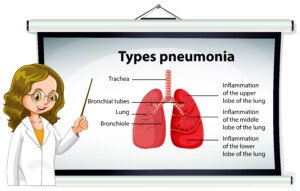
Non-walking pneumonia refers to a more serious type, while “walking” refers to a less threatening type that some people claim has gone away without treatment.
If you don’t treat the so-called non-walking pneumonia, can it resolve on its own?
“No, it can’t,” says Susan L. Besser, MD, with Mercy Medical Center, Baltimore, and Diplomate American Board of Obesity Medicine and board certified by the American Board of Family Medicine.
“In this case the pneumonia is due to a bacterial infection and antibiotics are needed to treat it,” explains Dr. Besser.
“The difference in terminology is colloquial. ‘Walking’ pneumonia implies it is less severe and treatable as an outpatient (oral antibiotics).
“‘Non-walking’ pneumonia is more severe and requires hospitalization for supportive care (usually oxygen therapy and IV antibiotics). Medical professionals don’t use this terminology, by the way.”
What about “regular” pneumonia?

Dr. Besser exlains, “‘Regular’ pneumonia is also colloquial, but I suspect it refers to the more standard bacterial types as opposed to unusual causes (such as unusual bacteria or a mass in the lung that causes a portion of the lung to be blocked which causes bacteria to grow in that area without being able to be cleared).”
Don’t get caught up with terminology. If you suspect pneumonia, get to the emergency room where antibiotics can be started immediately after the diagnosis.
Vital Tips
• Be leery of the validity of people who claim to have gotten rid of their pneumonia without treatment. It’s possible that they were misdiagnosed, since pneumonia on a chest X-ray can resemble less serious conditions.
• A person can have pneumonia without having a frequent cough.
• This infection can turn very ugly rapidly after festering at a lower level for days.
• Just because aspirin may make the fever of pneumonia disappear doesn’t mean that aspirin is effective at killing off the infection!
• Treatment for this common killer is very effective when administered in a timely fashion, but futile when the patient gets to the emergency room too late.
• The time for ER treatment is before the infection has taken an abrupt turn for the worse.
Early intervention is crucial to prevent complications and manage the condition effectively.
If symptoms such as severe chest pain, difficulty breathing or high fever persist or escalate, it’s essential to seek prompt medical attention.
Timely treatment can help mitigate the risk of severe outcomes and facilitate a more effective recovery.
 Dr. Besser provides comprehensive family care, treating common and acute primary conditions like diabetes and hypertension. Her ongoing approach allows her the opportunity to provide accurate and critical diagnoses of more complex conditions and disorders.
Dr. Besser provides comprehensive family care, treating common and acute primary conditions like diabetes and hypertension. Her ongoing approach allows her the opportunity to provide accurate and critical diagnoses of more complex conditions and disorders.
 Lorra Garrick has been covering medical, fitness and cybersecurity topics for many years, having written thousands of articles for print magazines and websites, including as a ghostwriter. She’s also a former ACE-certified personal trainer.
Lorra Garrick has been covering medical, fitness and cybersecurity topics for many years, having written thousands of articles for print magazines and websites, including as a ghostwriter. She’s also a former ACE-certified personal trainer.
.

























